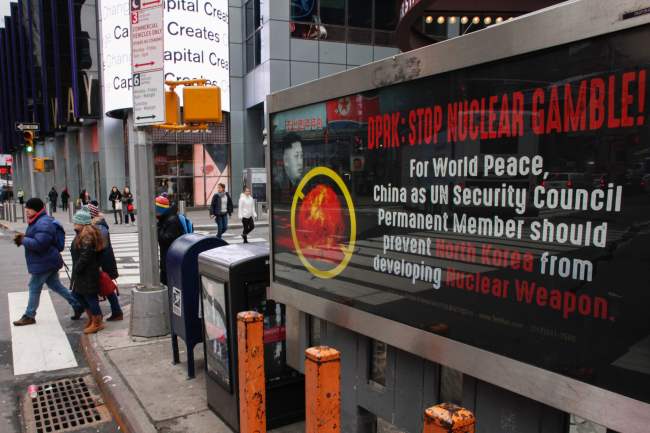In the aftermath of North Korea’s fresh nuclear and missile tests, South Korea, the U.S. and Japan are stepping up their drive to bolster their three-way security partnership while coordinating on unilateral and joint sanctions.
Gen. Lee Sun-jin, head of South Korea’s Joint Chiefs of Staff, will join a teleconference Thursday with U.S. JCS chairman Gen. Joseph Dunford who is hosting Adm. Katsutoshi Kawano, chief of the Joint Staff of Japan Self-Defense Forces, in Hawaii.
The top military commanders are expected to assess Pyongyang’s Jan. 6 underground detonation and last Sunday’s rocket launch, as well as the current cross-border situation, and explore their responses to a possible additional provocation.
 |
| A sign in New York City urging North Korea to halt its nuclear weapons development (Yonhap) |
They will also likely seek to forge a formal, comprehensive trilateral intelligence-transfer accord, built on their December 2014 arrangement focusing on North Korea.
The three-way gathering, initially planned earlier then postponed amid signs of the communist state’s imminent rocket liftoff, follows a video meeting last Friday of their vice JCS chairmen.
“During the latest session, the JCS chiefs will discuss closely ways to enhance their trilateral information sharing and cooperation with regard to the North’s nuclear and missile threats,” Seoul’s JCS said in a statement.
The recent provocations provided the three nations with a catalyst for further spurring their security partnership already boosted by a settlement late December between Seoul and Tokyo on the sex slavery dispute that has long been a sticking point for greater cooperation.
Shortly after the missile takeoff, the Defense Ministry here said in a report to the National Assembly that it is looking to high-level consultations and a joint operational planning team with the U.S. and Japan. A deputy-minister-level tripartite video conference took place the same day.
President Park Geun-hye also had phone calls on Tuesday separately with U.S. President Barack Obama and Japanese Prime Minister Shinzo Abe as part of efforts to form a united front against Pyongyang’s defiant behaviors.
The ministry also introduced plans late last month to facilitate real-time data-sharing with the U.S. by connecting their interface control centers at Osan air base in Gyeonggi Province through the “Link-16” system.
But ministry officials sought to downplay the initiative’s impact on the three-way push, apparently wary of lingering resentment toward military collaboration with Korea’s former occupier, saying it does not necessarily mean a prelude to a real-time information transfers and eventually a full-fledged pact with Japan.
The ministry also denied a report by Japan’s Kyodo News that Seoul’s Defense Minister told the parliament last Sunday he was considering a formal intelligence-sharing accord with Tokyo.
“Our position remains unchanged that any such settlement will be possible when the conditions are mature,” it said in a statement, stressing the need for the support from the assembly and people.
In 2012, South Korea called off at the last minute a signing ceremony with Japan for the bilateral General Security of Military Information Agreement — designed to enable the exchange of intelligence on North Korea and search-and-rescue-related operations — in the face of vehement public and political criticism for holding negotiations in secret. The tripartite “arrangement” was the product of the debacle.
Seoul has since brushed off a string of open overtures for and news reports from Japan on consultations over GSOMIA and an Acquisition and Cross-Servicing Agreement, which will allow their militaries to better supplement each other’s services and supplies such as on overseas missions.
Pyongyang’s latest provocations could essentially remove the thorn, making way for the old foes to intensify military cooperation, with Washington acting as a facilitator, observers say.
“From a practical point of view, GSOMIA and ACSA will be beneficial for both countries,” a former government official said, requesting anonymity due to the sensitivity of the matter.
“If Seoul were to take that path, however, it should come clean about its move and make efforts to persuade the parliament, public and other elements of society so as to fend off their backlash.”
On the sanctions front, South Korea, the U.S. and Japan are exploring individual or joint embargoes, aside from the ongoing U.N. Security Council discussions.
Their envisaged measures are aimed at plugging any holes stemming chiefly from North Korea’s sanctions-dodging tactics and China, the isolated, impoverished country’s economic and diplomatic lifeline.
In another development, Seoul on Wednesday declared a closure of a joint factory park in the North Korean border town of Gaeseong. It also announced last Sunday that it will officially begin talks on a stationing of advanced U.S. missile defense assets here, while expanding anti-Pyongyang loudspeaker broadcasts across the Demilitarized Zone and joint military exercises with the U.S.
Washington is reportedly setting sights on steps to choke North Korean trade and finance such as through a partial ban on port entries around the world and a cutoff of banking transactions similar to the ones previously levied against Iran.
Tokyo, for its part, is mulling reviving unilateral bans, including on money transfers and people-to-people exchanges, which were lifted in July 2014 in return for Pyongyang’s launch of an investigation into its abduction of Japanese citizens in the 1970s and ’80s.
By Shin Hyon-hee (heeshin@heraldcorp.com)

